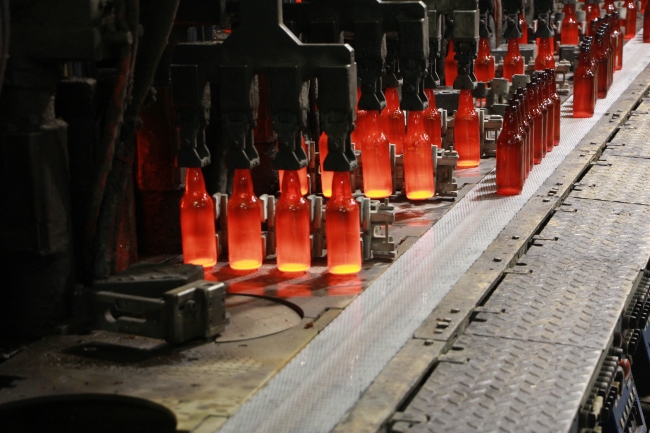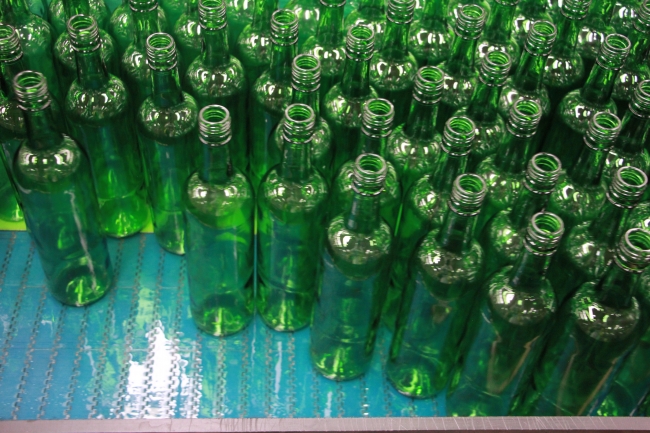3 minute read
Encirc & Glass Futures partner to develop world’s most environmentally friendly glass bottle
Leading glass container manufacturer, Encirc, and industry research and technology organisation, Glass Futures, are partnering on a ground-breaking project to create what should be the world’s most sustainable glass bottle.
In early 2021, Encirc’s Derrylin plant in Northern Ireland will be pioneering the use of bio-fuel on one of its furnaces, hoping to pave the way for an industry-wide reduction in carbon emissions.
Made out of plant materials, bio-fuel is a renewable and much more sustainable fuel source than those traditionally used by the glass sector, and is thought to be able to reduce carbon emissions by up to 90% when compared to fossil fuels. Alongside this trial, Encirc will be using up to 96% recycled glass to create the new bottles, further reducing the carbon footprint of its products.

Encirc has partnered with Glass Futures on a ground-breaking project to create the world’s most sustainable glass bottle / Picture: Encirc
The UK trial will be the world’s first and the results will feed into UK Government policy around decarbonisation. The project forms part of the Department for Business, Energy and Industrial Strategy (BEIS) Energy Innovation Programme, within which Glass Futures is leading a £7.1m project to help determine the most effective route to switch the glass sector to low carbon fuels.
A key focus for Glass Futures, and the bio-fuel project, is further reducing the sector’s carbon footprint and the impact of the glass manufacturing in the UK, futureproofing an industry directly employing 23,000 people.
Fiacre O’Donnell, Director of Sustainability, Vidrala (Encirc’s parent company), said: “Bio-fuel is just one part of the decarbonisation puzzle, but an incredibly important and exciting one. We’re also looking into the development of hydrogen, and advancements in electric melting to truly discover the future of glass production. We’ve already seen a huge level of interest from beverage suppliers in attaining the ultra-low-CO2 containers we’ll be making during the trial, which further suggests how united the industry is our quest for total sustainability.
“Glass is already a wonder material in terms of sustainability, able to be recycled a limitless number of times, without losing any quality. However, as with any manufacturing process, it is still an energy-intensive sector. By working with Glass Futures, we can help pioneer the development of a glass bottle which will truly have no negative impact on the environment.”

Encirc’s Derrylin plant in Northern Ireland will be pioneering the use of bio-fuel on one of its furnaces and using up to 96% recycled glass to create the new bottles / Picture: Encirc
Rob Turvey, Sales & Marketing Director at Encirc, added: “This has never been attempted before and is a massively exciting innovation opportunity for us at Encirc, our customers and, of course, their consumers. The trial will help us support our customers in our joint ambitions to decarbonise the container glass supply chains and further demonstrate why glass is the most environmentally beneficial packaging format for the world’s leading food and beverage brands”.
Alongside the 30-day trial, Encirc also has aspirations to boost the sustainability of its logistics operations switching out their fuel sources for bio-fuel.
Aston Fuller, General Manager of Glass Futures, said: “We are proud to be a part of a trial that both BEIS and Encirc have made possible, Encirc has taken a pragmatic approach and is pushing the innovation boundaries with a full-scale trial of a new alternative fuel. It is great to see the whole supply chain collaborate to explore what is possible within the industry.
“While the UK glass sector has made progress by more than halving its emissions over the past 50 years, it is vital we work together to advance towards the net zero carbon goal.”